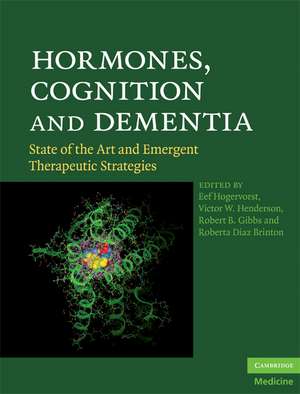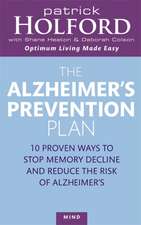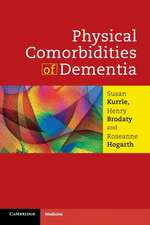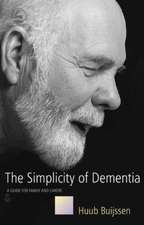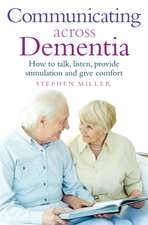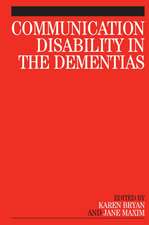Hormones, Cognition and Dementia: State of the Art and Emergent Therapeutic Strategies
Editat de Eef Hogervorst, Victor W. Henderson, Robert B. Gibbs, Roberta Diaz Brintonen Limba Engleză Hardback – 23 sep 2009
Preț: 716.25 lei
Preț vechi: 753.94 lei
-5% Nou
Puncte Express: 1074
Preț estimativ în valută:
137.06€ • 144.12$ • 113.25£
137.06€ • 144.12$ • 113.25£
Carte tipărită la comandă
Livrare economică 16-30 aprilie
Preluare comenzi: 021 569.72.76
Specificații
ISBN-13: 9780521899376
ISBN-10: 0521899370
Pagini: 292
Ilustrații: 12 b/w illus. 4 colour illus. 9 tables
Dimensiuni: 192 x 252 x 18 mm
Greutate: 0.79 kg
Editura: Cambridge University Press
Colecția Cambridge University Press
Locul publicării:Cambridge, United Kingdom
ISBN-10: 0521899370
Pagini: 292
Ilustrații: 12 b/w illus. 4 colour illus. 9 tables
Dimensiuni: 192 x 252 x 18 mm
Greutate: 0.79 kg
Editura: Cambridge University Press
Colecția Cambridge University Press
Locul publicării:Cambridge, United Kingdom
Cuprins
Preface; Part I. Estrogens and Cognition: 1. Women's Health Initiative Memory Study (WHIMS) program; 2. Identifying risk-factors for cognitive change in the Women's Health Initiative; 3. Estrogen therapy – relationship to longevity and prevalent dementia in the oldest-old; 4. The critical window hypothesis: hormone exposures and cognitive outcomes after menopause; 5. Animal studies that support estrogen effects on cognitive performance and the cholinergic basis of the critical period hypothesis; Part II. Varieties of Estrogenic Therapy: 6. The healthy cell bias of estrogen action through regulating glucose metabolism and mitochondrial function; 7. Alternative estrogenic treatment regimes and the Kronos Early Estrogen Prevention Study-Cognitive and Affective Substudy (KEEPS-CA); 8. The use of transdermal 17-estradiol in the treatment of Alzheimer's disease; 9. Alternative modes of treatment: pulsatile estradiol treatment; 10. In search of estrogen alternatives for the brain; Part III. Potential Modulators and Modifiers of Estrogenic Effects: 11. Progesterone regulation of neuroprotective estrogen actions; 12. Clinical data of estrogen's effects in the central nervous system; 13. Different forms of soy processing may determine the positive or negative impact on cognitive function of Indonesian elderly; 14. Hypothalamus-pituitary-adrenal axis activity in aging women; Part IV. Possible Genetic Factors Related to Hormone Treatment Effects: 15. Possible genetic polymorphisms related to sex steroid metabolism and dementia in women; 16. Genetics related to sex steroids: implications for Alzheimer's disease; 17. Apolipoprotein E, hormone therapy and neuroprotection; 18. Testosterone, gonadotrophins and genetic polymorphisms in men with Alzheimer's disease; Part V. Testosterone, Estradiol and Men, and Sex Hormone Binding Globulin: 19. Androgens and cognitive functioning in women; 20. The role of estradiol in testosterone treatment; 21. Endogenous testosterone levels and cognitive aging in men; 22. Clinical trials and neuroimaging studies of testosterone in men: insights into effects on verbal memory; 23. Testosterone therapy and Alzheimer's disease: potential for treatment and prevention in women; 24. Endogenous estradiol and dementia in elderly men: the roles of vascular risk, sex hormone binding globulin, and aromatase activity; 25. Testosterone regulates Alzheimer's disease pathogenesis; Part VI. Gonadotropin Effects: 26. Involvement of gonadotropins in cognitive function: implications for Alzheimer's disease; 27. The role of gonadotropins and testosterone in the regulation of beta amyloid metabolism; 28. Epilogue; 29. Concluding remarks; Index.
Recenzii
'… an excellent book for understanding where the field stands today regarding sex hormones for the treatment of brain aging and dementia.' Doody's
Descriere
Basic and clinical research on sex steroids, ageing, and cognition to integrate existing findings with emerging data.
